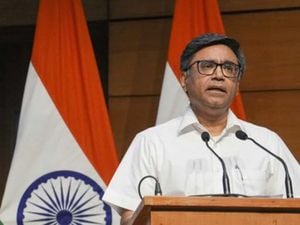In a dramatic escalation of tensions between nuclear powers India and Pakistan, the Indian military has launched airstrikes targeting what it describes as "terrorist infrastructure" in Pakistan and the Pakistan-administered region of Kashmir. The announcement, made by India’s Ministry of Defense late on May 6, 2025, comes just two weeks after a deadly terrorist attack in the Indian-controlled part of Kashmir that left 26 people dead, primarily Indian tourists.
According to Indian officials, nine targets were struck in the operation, which they assert were aimed specifically at facilities involved in planning and executing attacks against India. The Indian government emphasized that no military installations were targeted. However, the Pakistani military reported that the strikes occurred in various locations, including the cities of Kotli and Muzaffarabad in Kashmir, as well as Bahwalpur in Punjab, where a mosque was reportedly hit.
Pakistan's Foreign Ministry confirmed that the airstrikes resulted in casualties, stating that eight individuals were killed and 33 others injured, with reports indicating that women and children were among the victims. The Pakistani military initially noted the death of a child in Bahwalpur, underscoring the tragic impact of the attacks.
In response to the airstrikes, Pakistani Prime Minister Shehbaz Sharif declared that Pakistan has "every right to give an appropriate response to this act of war imposed by India, and an appropriate response will also be given." The escalating situation has led to heightened military readiness on both sides, with reports emerging that Pakistan shot down two Indian fighter jets shortly after the airstrikes. Some sources later revised the number of downed aircraft to five, further intensifying the conflict.
The backdrop to this military confrontation is rooted in a long-standing rivalry that dates back to the partition of British India in 1947, which created the predominantly Hindu nation of India and the Muslim-majority state of Pakistan. Since their independence, both countries have fought three wars, two of which were over the disputed Kashmir region, which remains a flashpoint of conflict.
The recent hostilities were ignited by a terrorist attack on April 22, 2025, when armed assailants targeted tourists in a mountainous area near Pahalgam, killing 26 people. India has accused Pakistan of complicity in the attack, a charge that Islamabad vehemently denies. In the wake of the attack, both nations have engaged in reciprocal sanctions, including the expulsion of diplomats and citizens, and have reduced diplomatic relations.
Notably, India's suspension of the Indus Water Treaty—a 1960 agreement that governs water sharing between the two countries—has been deemed particularly severe by experts. Islamabad has labeled this suspension as a declaration of war, threatening countermeasures that could exacerbate the already fraught situation. The Indus River is crucial for Pakistan, serving as a vital water source for millions.
As the airstrikes unfolded, social media platforms were flooded with videos purportedly showing the aftermath of the bombings, including scenes of destruction in Bahwalpur. The Pakistani military has since closed its airspace for 48 hours, and flight operations at airports in Islamabad and Lahore have been suspended, indicating the seriousness of the situation.
The conflict's historical roots are deep, with the violent partition of 1947 resulting in significant communal violence and mass migrations. The Kashmir region, divided between India and Pakistan, has been a contentious territory ever since, with both nations claiming the entire region as their own. The ongoing hostilities reflect a cycle of violence and retaliation that has persisted for decades.
In the context of international relations, the recent escalation raises concerns about the potential for a larger conflict between the two nuclear-armed neighbors. The global community watches closely, as any miscalculation could lead to catastrophic consequences. Diplomatic efforts to de-escalate the situation are urgently needed, but with both sides entrenched in their positions, finding common ground may prove challenging.
As of now, the situation remains fluid, with both nations bracing for further developments. The international community is urged to intervene diplomatically to prevent an escalation into full-blown conflict. With the stakes higher than ever, the eyes of the world are on India and Pakistan as they navigate this perilous chapter in their tumultuous history.






